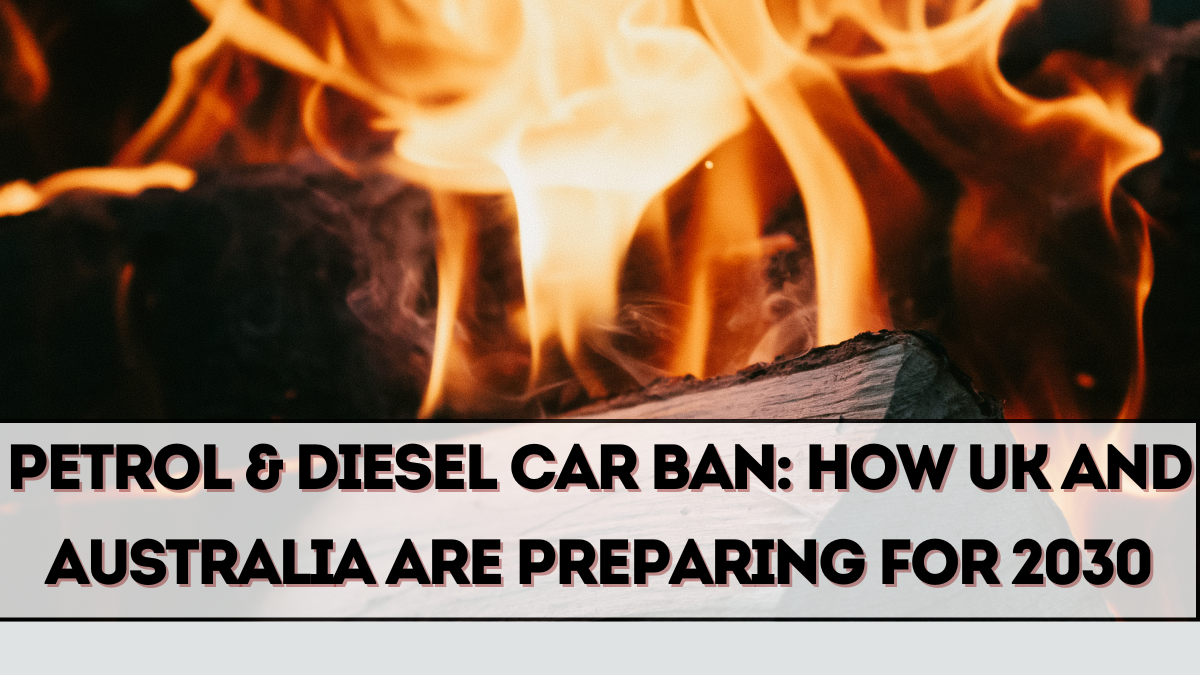The shift away from fossil fuels is now irreversible, and the countdown to the petrol and diesel car ban has officially begun. By 2030, the United Kingdom will ban the sale of new petrol and diesel cars, while Australia is laying out its own roadmap toward a similar transition. This landmark change marks one of the most ambitious environmental policies of the century, aimed at cutting emissions, promoting cleaner air, and encouraging widespread adoption of electric vehicles (EVs) and hybrids.
The Petrol and Diesel Ban Countdown is not just about climate goals; it’s about reshaping entire transport systems, boosting EV infrastructure, and ensuring drivers are prepared for a new era of sustainable mobility.

Why a 2030 Ban?
Governments worldwide face mounting pressure to tackle climate change, and transport emissions are a major contributor. Cars powered by petrol and diesel account for nearly one-fifth of global CO2 emissions. By setting a 2030 deadline, the UK has taken a bold stance, with Australia gradually moving in the same direction. The reasons include:
-
Climate Targets: Meeting net-zero commitments under the Paris Agreement.
-
Public Health: Reducing air pollution linked to respiratory and heart diseases.
-
Technological Growth: Rapid improvements in EV batteries and charging technology.
-
Global Leadership: Positioning the UK as a pioneer in green policy and urging other countries to follow.
UK’s Roadmap to 2030
The UK has one of the most detailed plans in the world for phasing out petrol and diesel cars. Key measures include:
-
2030 Ban on Sales: No new petrol or diesel cars can be sold after this date.
-
Hybrid Allowance: Certain plug-in hybrids will still be allowed until 2035.
-
Charging Infrastructure: £1.6 billion invested in charging points, aiming for 300,000 public chargers by 2030.
-
Financial Incentives: Grants, tax benefits, and subsidies for EV buyers.
-
Industry Transformation: Car manufacturers encouraged to shift production toward EVs, with penalties for failing to meet emission targets.
By 2030, the UK expects at least half of new cars sold to be fully electric, supported by the rapid expansion of its charging network.
Australia’s Approach
Unlike the UK, Australia does not yet have a nationwide ban date but several states are taking action:
-
New South Wales: Aiming to ban sales of new petrol and diesel cars by 2035.
-
Victoria: Incentives in place but no confirmed ban date.
-
Queensland and Others: Focusing on EV infrastructure and subsidies first.
Australia is currently investing in fast-charging networks across highways and major cities, ensuring long-distance travel becomes feasible for EV owners. While the federal government has not announced a firm 2030 ban, pressure from environmental groups and global market trends may accelerate timelines.
Challenges in the Transition
Moving away from petrol and diesel cars is not without hurdles. Both the UK and Australia face challenges, including:
-
Charging Infrastructure Gaps: Rural areas still lack reliable fast-charging stations.
-
Vehicle Affordability: EVs remain more expensive upfront compared to petrol cars.
-
Battery Supply Chains: Dependence on lithium and rare earth materials creates global competition.
-
Public Awareness: Many drivers remain skeptical about EV range and reliability.
Governments are addressing these through subsidies, research into alternative battery materials, and awareness campaigns.
Economic and Social Impact
The fossil fuel ban has wide-reaching effects beyond the environment.
-
Automotive Industry: Traditional carmakers are transitioning production lines, creating demand for new skills and green jobs.
-
Fuel Industry: Declining petrol and diesel demand will reshape the energy sector.
-
Consumers: While EVs may cost more upfront, long-term savings on fuel and maintenance are significant.
-
Insurance: EV-specific insurance products are growing, influenced by battery costs and repair trends.
Both the UK and Australia see the ban as an opportunity to stimulate innovation, create jobs, and lead in sustainable technology.
Benefits of the Ban
Despite challenges, the benefits are clear:
-
Cleaner Cities: Lower emissions mean reduced smog and healthier air.
-
Lower Running Costs: EV drivers save up to 50% on fuel and 30–40% on maintenance.
-
Energy Independence: Reduced reliance on imported fossil fuels.
-
Climate Impact: Major step toward net-zero emissions.
The vehicle shift will not only transform transport but also improve quality of life.
What Drivers Should Do Now
With the countdown to 2030 underway, drivers should start planning:
-
Consider EVs or Hybrids: Transition early to benefit from subsidies and incentives.
-
Install Home Chargers: Prepare for the convenience of overnight charging.
-
Stay Updated on Policies: Check government websites for rebates and tax breaks.
-
Resale Planning: Petrol and diesel vehicles may lose value rapidly as the deadline nears.
By acting now, drivers can save money and avoid last-minute rushes when bans take effect.
Looking Beyond 2030
The Petrol and Diesel Ban Countdown is only the beginning. Experts predict:
-
Widespread EV Adoption: EVs becoming the default choice worldwide.
-
Hydrogen Vehicles: Gaining popularity for long-haul transport.
-
Smart Cities: Integration of EVs with renewable energy grids.
-
Autonomous EVs: Combining automation with clean power for efficient transport.
Both the UK and Australia are preparing for a future where fossil fuel cars are no longer part of the mainstream market.
FAQs
When will the UK ban petrol and diesel cars?
The UK will ban sales of new petrol and diesel cars from 2030, with hybrids allowed until 2035.
Is Australia banning petrol and diesel cars by 2030?
Australia has not set a federal 2030 ban, but states like New South Wales plan to phase out sales by 2035.
Will petrol and diesel cars already on the road be banned?
No, existing vehicles can still be driven, but resale values may decline.
Are EVs cheaper to run than petrol cars?
Yes, EVs save around 40–50% in fuel costs and 30–40% in maintenance.
Click here to know more.
